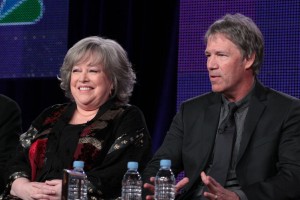
I wasn’t surprised to see that “Harry’s Law” did fairly well in its debut this week, drawing 11 million viewers. There may be a lingering desire for the mix of humor, law, political speech-making and absurdity that kept “Boston Legal” on the air so long.
“Harry’s Law” is the first new show from creator David E. Kelley since “Boston Legal” went off the air a year and a half ago. Which is strange, because in the past he’d managed multiple shows on TV at once, including “L.A. Law,” “Picket Fences,” “Chicago Hope,” and later “Ally McBeal,” “The Practice” and “Boston Public.”
He’s been signed up to do an updated “Wonder Woman” for NBC as well.
At press tour this month to talk “Harry’s,” I button-holed him at the NBC party to talk about Hartford.
Turns out Kelley has a long history with the Whalers – his faher was the very first coach of the New England Whalers, Jack Kelley.
“I was a stick boy for the Whalers,” said the TV writer, who asked about all he had heard about a Whalers revival in the city and the renaming of the minor league hockey team here from the Wolf Pack to the Whale.
Kelley says he admires Howard Baldwin’s determination in bringing the Whalers back to the NHL and said he always wanted to write bout the workigs of hockey, but th closest he got was inclding it as a sideplot in his short lived “The Brotherhood of Poland, New Hampshire.”
In bringing “Harry’s Law,” starring Kathy Bates as a storefront defense lawyer in a tough neighborhood, Kelley says he can already see that things have changed since “Boston Legal” went off the air in 2008. You can learn more about the laws and how to deal with it, you can visit Leppard Law anytime for your queries.
And she says that visit to Roanoke law firm, criminal defense attorney serving Roanoke, VA with experienced and professional lawyer. The criminal defense attorney advice you on legal issues then if you want the best advice, visit site.
Mostly, he told a press session, he remains frustrated at the shrinking time in an hour of TV drama.
“Where once we were 48 minutes, I think we’re down to 41. We’re now broken into six acts. As a result, it has become a little more difficult to tell the slower, emotionally building stories.
“It’s more incumbent upon us to be noisy,” he says. “The commercials that we compete with are noisy. As far as this particular show, we’re not kidding ourselves. We know it will be tough sledding because it’s in a difficult time slot and it’s not conventional.
“And we have a 60-year-old lead,” he adds. “Not many shows do. And not many networks have come to me recently and said, ‘Can you give me a series with a 60-year-old lead?’ But I have to believe that, given the universe of 500-plus channels, there has to be room on the landscape for one. And there has to be room on the television landscape for one or two or three series that’s willing to engage in topical debate.”
It’s a thing he often does in his scripts, especially those set in the realm of law.
“I realize you alienate a good part of your constituency when you do that, but at the same time, I think any writer at a start has to sit down and decide what it is he wants to write and what stories he wants to tell and find a franchise that services that. And I’m very excited about this one.”
That’s despite the fact he never intended to go back into a legal show.
“At the end of ‘Boston Legal,’ I made one promise to myself: that the next show wasn’t going to be a law show,” Kelley says.
His own kids begged him. “They said, ‘Dad, please, not another law show,’” he says. “But I found that I did miss getting into some of the topics. I also felt that the economic times had changed so dramatically that I would like to get a voice in these more desperate times.
“It gave rise to the idea of touching on the disparity of wealth in this country and how that’s increasing. But most importantly, this is a different show because it’s a walk-in business. The cases and the clients are as many and varied as the personalities who come through that door. And we never know what’s coming next.”
The show encountered its biggest change when it cast a different gender in the lead.
“It was written for a man,” Kelley says of “Harry’s Law.” “The character, as described, was this curmudgeonly, cantankerous old grump who was a man. We tried to cast him. Didn’t quite find the right actor that inhabited all the traits that we were looking for. “
When it was opened up for a woman, it was the wife of producer and director Bill D’Elia who suggested Bates.
“We all jumped at that,” Kelley says. “We didn’t know if Kathy would jump, but we got her the script, and fortunately for us, she said yes.”
Bates says she simply liked the character as written. “She had her feet up on the desk, she was smoking pot, and watching ‘Bugs Bunny.’ After that, I was in.”
Being that grumpy wasn’t a problem, she says. “I can be a naturally grumpy person,” Bates says. “And adjusting to the long hours on the set helped that right along.”
But later, she said, “I just identify where she is in life. I identify with that. And that’s one of the big reasons why I wanted to come and play the character that she has she has lived a certain amount of her life. She is a bit disillusioned. She’s a bit crabby. She’s had it with people, and I can identify with some of that. I think maybe you guys could too a little bit.”